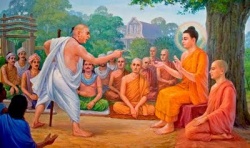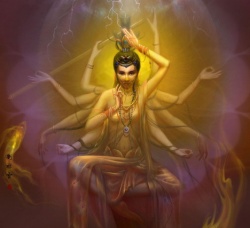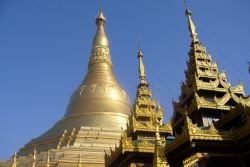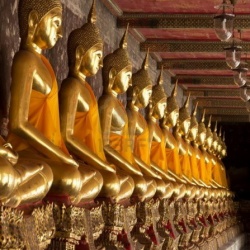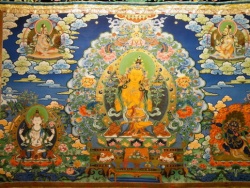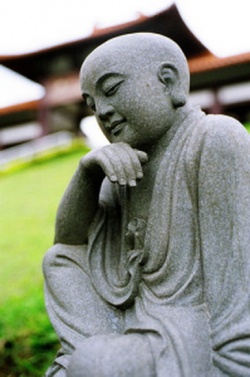Buddhacarita
The Buddhacarita, ‘Acts of the Buddha,’ was the first realistic and complete biography of the Buddha and was written by the famous Indian poet Aśvaghoṣa in about the 2nd century CE. Earlier attempts at a biography are either incomplete, like the one in the Vinaya, or like the Lalitavistara, are so full of hyperbole as to be more romance than fact. The Buddhacarita follows the events in the Buddha’s life as recorded in the Tipiṭaka quite closely but elaborates some parts for the sake of dramatic and didactic effect. The 2132 elegant and lyrical Sanskrit verses of the Buddhacarita have led it to be considered one of the greatest masterpieces of Indian literature.
Chapter XV - Turning the Wheel of the Law
1. The Tathāgata was in complete quietude, and his light was manifestly shining. With dignified deportment, he walked alone but as if followed by a large crowd.
2. On his way he met a brahman, whose name was Upaga. Maintaining the deportment of a bhikṣu, he respectfully stood by the side of the road.
3. Pleased to meet someone wonderful, Upaga held his palms together and remarked, “Beings are all attached, but you have the appearance of someone without attachment.
4. “Thoughts in the world are unsteady, but you alone have quieted your faculties. Your bright countenance is like the full moon; it is as if you are savoring the ford to immortality.
5. “Your appearance has the characteristics of a great person, a sovereign king with the power of wisdom. What you had to do is certainly done. Which teacher did you apply to for teaching?”
6. [The Tathāgata] answered, “I have no teacher nor any teaching. I am unsurpassed. I have my own insight into the very profound Law. I have obtained what others could not obtain.
7. “I now have complete understanding of what others should understand but that no one in the whole world has understood. So I am called one with right awakening.
8. “Afflictions are like enemies. I have subdued them with the sword of my knowledge. And so, extolled in the world, I am called superior.
9. “I shall go to Vārāṇasī and beat the drum of the law of immortality. I am without arrogance, nor do I dwell upon fame, nor do I seek for the happiness of any benefit.
10. “Indeed, I will propagate the Right Law and rescue suffering beings. Because I have made a great solemn oath in the past, I shall save those who are not yet saved. The result of my oath will be accomplished now. I will fulfill that previous vow.
11. “When one has provided riches for oneself, one is not extolled as a famous righteous person, but if one benefits the whole world, then one is called a great person.
12. “If one does not bring rescue from drowning in the face of danger, why would one be called a valiant person? If he does not cure the sick, how would he be called a good doctor? If he sees someone who is lost but does not show him the way, who would call him a good guide?
13. “When, for instance, a lamp shines in the darkness, it is a natural light for the unwitting. When the Tathāgata lights the lamp of wisdom, there is no feeling of desire.
14. “When rubbing sticks, one is sure to obtain fire. In the sky wind is natural. When digging in the ground, one is sure to obtain water. All this is reasonable and natural.
15. “The accomplishment of the path by all munis is sure to occur in Gayā, and they have also been turning the wheel of the Right Law in the land of [[Kāśi].”
1`6. The brahman Upaga said “Ha!” in praise and amazement. In accordance with his previous plans, he continued on his way, and they separated. But with every step he looked back and paused, remembering the wonder. 17. The Tathāgata gradually traveled ahead and reached the city of Kāśi. The land was excellently adorned, like the palace of Śakra, ruler of the gods.
18. In the place where the two rivers, the Ganges and the Vārāṇasī, both flow, trees, flowers, and fruits were luxuriant. Birds and animals roamed together.
19. It was silent, without any noisy commoners. The ancient seers had dwelled there. The Tathāgata’s light was shining and doubled its brightness.
20. The [first] son of the Kauṇḍinya family; and the second one, Daśabala Kāśyapa; the third one, called Vāṣpa; the fourth, Aśvajit; and the fifth one, called Bhadrika, had been practicing austerities, rejoicing in the mountain forest.
21. They saw the Tathāgata coming from afar. They gathered, sat down, and all talked it over. “Gautama is tainted by worldly happiness and he has abandoned any asceticism.
22. “Now he returns here. Do not rise to welcome him, and do not do obeisance or make polite inquiries either, providing him with what he needs! Because he has abandoned his former oath, he should not receive any worship!”
23. When a common person has a visitor, he should perform a sequence of proprieties. He should arrange for bedding and seating and make him feel at ease.
24. But after they had made this agreement, each [of the five bhikṣus] kept sitting in his place. As the Tathāgata approached them, however, they unconsciously disregarded their agreement.
25. One offered to give up his seat, and another took his garment and bowl for him. One begged to wash his feet, and another asked after his needs.
26. In such different ways they honored him and were of service, as if to a teacher. But they did not give up his family [[[name]]] and still called him Gautama.
27. The World-honored One said to them, “Do not call me by my former surname and utter a contemptuous word for an arhat!
28. “My mind is completely equal concerning respect or disrespect. If you are not respectful in your heart, it is you who will incur the blame.
29. “Because a buddha can save the world, one calls him a buddha. He has an equal mind toward all beings, thinking of them as his children, as it were. But to call him with his former name is like an offense of arrogance against one’s father.”
30. The Buddha had told them in his mercy, with great compassion, but they followed their foolish minds and did not believe his right awakening.
31. “You say that in your previous practice of austerities you had not yet obtained anything. Now that you have indulged in the pleasures of the body and mouth, how could you have become a buddha?”
32. With such doubts they did not believe that he had obtained the path of a buddha, that he had completely achieved the meaning of the truth and was endowed with omniscience.
33. The Tathāgata then briefly expounded his essential path to them. “A fool [either] practices asceticism or happily continues pleasing his [[[sense]]] faculties.
34. “Look at these two different things! They are a great mistake. Because they go against deliverance, it is not so that they are the right path.
35. One may practice asceticism with an exhausted body but the mind will still rush on in confusion. If one does not even give rise to worldly knowledge, much less will one be able to surpass the faculties!
36. “If one lights a lamp with water, one will never remove the darkness. One may try to develop the lamp of wisdom with an exhausted body but one will not be able to destroy foolishness.
37. “If one wants [to make a] fire with decayed wood, one toils in vain and will not obtain it. But if one rubs a stick and makes effort, one may immediately obtain fire and use it.
38. “In one’s search for the path, one does not obtain the law of immortality through asceticism. Attachment to desire is meaningless, and foolishness is an impediment to the light of wisdom. If one does not even understand the scriptural texts, much less will one obtain the path of freedom from desire!
39. “If one has a grave illness but does not eat the food that helps cure that illness, how could the grave illness of ignorance be done away with while one is attached to desire?
40. “If one sets fire to dry grass in the wilderness and it is increased by a fierce storm, who could extinguish the blaze? The same applies to the fire of greed.
41. “I have left the two extremes. My mind stays in the middle path. All my suffering is finally appeased. I am tranquil, free from any error.
42. “My right view surpasses the sunshine, and my equal conceptualization is my conveyance. Right speech is my abode and I am on an excursion in the forest of right action.
43. “Right livelihood is a rich disposition, and application is the right road. Right mindfulness is the city wall, and concentration is bedding and seating.
44. “The eightfold path is level and right, the escape from the suffering of birth and death. For those who embark on this road, what they have to do will be completely achieved. They will not fall into a painful fate in the two worlds, yonder and here.
45. “The three worlds are but a mass of suffering and only this path can extinguish it. My pure eye of the Right Law, formerly unheard of, has fully seen the path of deliverance. Yes, I have for the first time given rise to it now!
46. “Birth, old age, illness, and death are suffering; separation from what one loves or meeting with enmity, not attaining something one wants, and so on are kinds of suffering.
47. “If one renounces desire or does not yet renounce it, has a body or is without a body, if one is without any pure quality, one may briefly say that all this is painful.
48. “When, for instance, a great fire is appeased, it does not give up its heat, even though it may have become smaller. Even in a self that is quiet and subtle by nature, great suffering still exists.
49. “The afflictions of greed and the others, and all kinds of wrong actions—these are the causes of suffering. If one gives them up, suffering is extinguished.
50. “When, for instance, seeds are without earth, water, and so forth, when all conditions are not combined, shoots and leaves do not grow.
51. “Existences continue by nature, from heaven to the woeful destinations. The wheel keeps turning and does not stop. This is produced by desire. Demotion differs according to weak, intermediate, or strong, but all kinds of actions are the cause.
52. “If one has extinguished greed and so forth, there is no continuation of existence. When all kinds of actions have ended, different kinds of suffering know long-lasting appeasement. If this exists, then that exists. If this is extinguished, then that is extinguished.
53. “Absence of birth, old age, illness, and death; absence of earth, water, fire, and wind; and both absence of beginning, middle, and end and condemnation of a deceptive law—these mean tranquility without end, abodes of the noble.
54. “The expounded eightfold right path and no other is the right means. When the world does not see it, [[[beings]]] are misled for a long time.
55. “I know suffering and the annihilation of its accumulation. I have realized its extinction and I have developed the right path. I have contemplated these four truths and I have gained perfect awakening.
56. “I tell you that I know suffering, that I have annihilated its impure cause, that I have caused the realization of its extinction, and that I have developed the eightfold right path. Knowing the four truths, my pure eye of the Law was achieved.
57. “When I had not yet brought about my universal eye concerning these four truths, I was not called delivered. I was not said to have done what I had to do, and it was not said that my complete understanding of the truth was accomplished.
58. “Because I knew the truths, I perceived that I was delivered. I perceived that what had to be done was done, and I perceived that I was perfectly awakened.”
59. When he expounded this truth, the son of the Kauṇḍinya family and the multitude of eighty thousand gods completely achieved true meaningfulness. Free from any impurity, they achieved the pure eye of the Law.
60. When the teacher of gods and humans knew that he had done what had to be done, he rejoiced and asked with a lion’s roar, “Kauṇḍinya, do you know yet?” Kauṇḍinya immediately said to the Buddha, “I know your Law, great teacher!”
61. Because he knew the Law, he was called Ājñāta Kauṇḍinya. Among Buddha’s disciples he was the first to gain the highest insight.
62. As he knew the sound of the Right Law, he heard the spirits of the earth all raise their voices and call out, “Splendid is the profound Law you have seen!
63. “You, Tathāgata, have turned today what has never yet been turned. For gods and humans everywhere you have widely opened the gate of immortality.
64. “Pure morality is the spokes. Self-discipline and quiet concentration are the axle cones. Firm knowledge is the felloe, and shame cleanses the axle hubs.
65. “Right mindfulness is considered the hub, completing the wheel of the True Law. You are right, having left the three worlds! You will not fall back and follow a heterodox teacher!”
66. When the spirits of the earth called out in this way, the spirits in the sky transmitted the call. The gods proceeded with praise, which penetrated up to the Brahma Heaven.
67. The celestial spirits in the three worlds heard the exposition of the great seer for the first time. As it spread, they were surprised and said to each other, “We have heard all around that the Buddha has appeared in the world. For the kinds of living beings he widely turns the wheel of the Law of quietude.”
68. A breeze cleared the sky, dissipating the mist, and celestial flowers rained from the sky. The gods played celestial music in praise of the wonder.
Asvaghosa’s Buddhacarita, trans. by E.H. Johnson, 1998.
